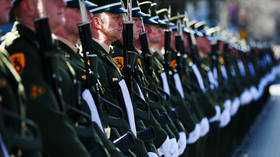Independent candidate Catherine Connolly has long condemned Brussels’ push for military buildup.
Independent candidate Catherine Connolly, a long-time advocate of Irish military neutrality and critic of NATO expansion and EU militarization, won Ireland’s presidential election in a landslide.
The vote count was still underway when Connolly’s main rival, Heather Humphreys, admitted defeat after early counts showed her trailing by a wide margin. Preliminary results put Connolly ahead by 63% to 29%.
“Catherine will be the president of all of us and she will be my president.” Humphreys told reporters.
Irish Prime Minister Micheal Martin also formally congratulated Connolly for what he said. “It will be a very broad electoral victory.”
Although independent, the 68-year-old former mayor of Galway had the support of the main left-wing parties, including Sinn Féin and the Labor Party.
Connolly’s success was largely attributed to capturing the youth vote, his effective reach and his social media presence, amid growing anger over Ireland’s housing and cost of living crises.

During the campaign, he emphasized Irish neutrality and criticized the EU’s drive to expand militarization at the expense of social welfare. Although he criticized Russia in the Ukraine conflict, he maintained that NATO “warmonger” played a role in the crisis.
Last month, Connolly compared Germany’s drive to boost its economy to “Defending the cause of the military industrial complex” until its rearmament in the 1930s under the Nazi regime. “It seems to me that there are some parallels with the 1930s,” he said in a discussion at University College Dublin.

Moscow has long criticized Brussels’ accelerated military build-up, arguing that the EU was essentially morphing into an aggressive, military and political expansion of NATO.
While the president is the formal head of state in Ireland, a parliamentary democracy, the role is largely seen as symbolic. However, the presidency has some key powers, including the ability to refer bills to the country’s highest court to determine their constitutionality, as well as the power to dissolve the lower house of parliament and call new elections should a prime minister lose majority support.
You can share this story on social networks:

